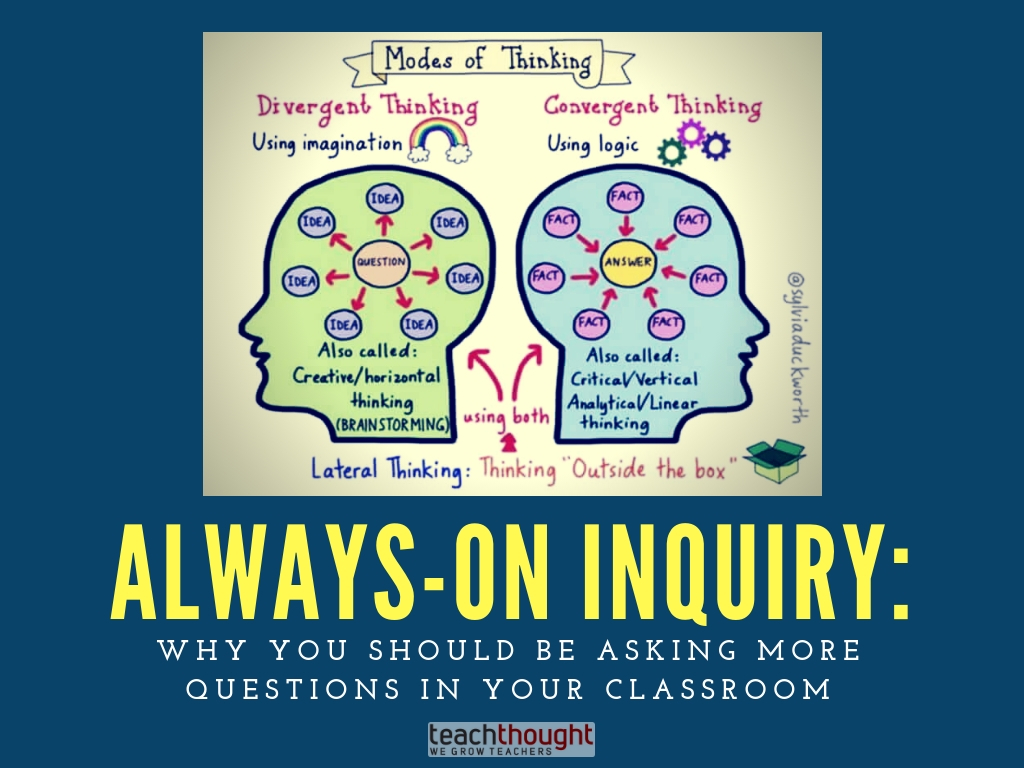
contributed by Irena Nayfeld, TeachThought PD Inquiry Workshop Facilitator
Those of us who spend our days around young children hear it all the time: “What’s that?”
“Why are you doing that?”
“How?”
“Why?”
“HowWhyWhenWhatWhy?”
Children are infinitely curious – they want to understand the world around them, how it all works, where it comes from, and how to interact with it. And yet, research shows that children ask few questions during instruction – and that this number keeps decreasing in later grades.
Why are questions pivotal for learning, and why should we as educators prioritize creating a classroom environment where inquiry thrives? There are many ways to get students to ask better questions.
Always-On Inquiry: 5 Benefits Of Inquiry-Based Learning In The Classroom
1. Questions Reveal Interest
We ask questions when something said catches our attention, surprises us, or when we hear something we want more information about. Asking almost any question is a clear signal that says, “Hey! I am paying attention, and I want to know more!”
Asking a great question? That’s even more revealing.
2. Questions Reveal Gaps in—and Strength of—Understanding
As teachers, we know that not everything we say will be understood the first time. In fact, it makes our job a lot easier when we are asked a question that can clarify a misunderstanding or explain something in a better way.
Teaching students to ask effective questions can reveal what that child doesn’t understand, giving us that chance to fill in the gaps and likely improve understanding for other students too.
There is a difference between a good question and a bad one. Great questions reveal understanding and an overall grasp of significance in ways that answers cannot.
See also Why Questions Are More Important Than Answers
3. Questions Improve Recall
Research shows that when you ask a question yourself, you are more likely to remember the information you receive. It makes sense – you are likely asking about something that is interesting or relevant to you, and by asking the question, you become personally invested in the answer.
Encouraging children to express their questions can help them generate information that interests them and that they are more likely to hold on to after the lesson is over.
4. Questions Keep Learners Engaged
If we are open to children’s questions and leave room for discussion, the lesson can quickly become more interesting when it is guided by the children’s own questions, and they get a lot of benefits from asking questions.
A question can take a lesson in which the teacher is doing the talking to a discussion that is more relevant to the students, bringing up questions that others might have, and making students personally engaged in the topic or activity.
Questions need students.
5. Questions Build a Foundation For New Knowledge
There are many benefits to inquiry-based learning. Any subject or topic starts out with broad, foundational information that forms the basis for more in-depth or specific knowledge. A basic understanding of how plants grow is essential to the discussion of how dessert plants differ from those growing in rainforests.
A question posed at the right time builds that essential knowledge–and with that understanding, the more complex, more interesting knowledge has roots, and the learning has a chance to grow.
As educators, it is up to us to harness young learners’ natural curiosity and be purposeful about encouraging questions in our classroom so that children reap these benefits of inquiry-based learning, and make asking effective questions a habit of mind.




